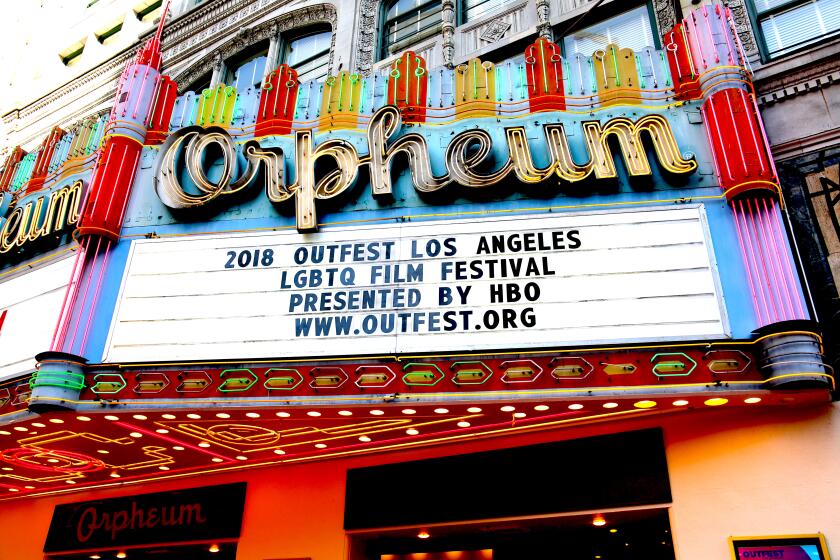Review: Jennifer Lopez is a star reborn in ‘Hustlers,’ a smart, bracing tale of strippers turned grifters
- Share via
TORONTO — The movies have rarely done right by Jennifer Lopez, but the brashly entertaining “Hustlers” isn’t just the exception that proves the rule; it reconfigures her cinematic image with such brazen intelligence and purpose that it seems determined to make up for lost time. As Ramona, a one-woman supernova who reigns over a New York strip club, Lopez gives her most electrifying screen performance since “Out of Sight,” slipping the movie into her nonexistent pocket from the moment she strides out onto a neon-lighted stage in a rhinestone bodysuit.
Ramona seizes hold of the pole and proceeds to run through a series of gravity-resistant acrobatics that reportedly took the actress months to master but will have your jaw on the floor in seconds. You might recognize the song in the background as Fiona Apple’s “Criminal,” whose opening lyrics (“I’ve been a bad, bad girl/I’ve been careless with a delicate man”) cheekily sum up the premise and the allure of this feel-good-feel-bad movie.
Written and directed by Lorene Scafaria (“The Meddler”), adapting a 2015 New York magazine article by Jessica Pressler, “Hustlers” tells the loosely fictionalized story of a group of strippers who decide to go rogue in wake of the 2008 financial crisis. Led by Ramona and her quick-study protégée, Destiny (Constance Wu), they con their wealthy clients each night, teasing and drugging them and blithely stealing thousands of dollars they (probably) won’t miss the next morning.
As a movie about the seductions of the flesh and the satisfactions of a well-executed con, “Hustlers” is brassy and invigorating, its pleasures obvious and right there on the surface. As a portrait of women at work, bickering and bonding and doing whatever it takes to get some measure of their own back, it’s smarter and more grounded than Hollywood has given us reason to expect, and told with a welcome matter-of-factness that can melt without warning into tenderness. Ramona may enter the movie in a shower of dollar bills, but in the next scene, she’s on a rooftop folding Destiny in an enormous fur coat, pulling her close and shielding her from the cold night air.
A few beats later, she’s showing Destiny the ropes, giving her an impromptu pole-dancing lesson while another stripper (Cardi B) coaches her on her lap-dancing techniques. It’s 2007, and Destiny, the designated naive-outsider protagonist, is still finding her footing, never an easy thing to do in stiletto heels. In one arresting early shot, the camera follows Destiny as she wobbles onto the club floor on a busy night: We can sense her excitement as well as her discomfort as she slinks past her more experienced rivals onstage, and also her eagerness to please when a client beckons her over with a “Hey, Lucy Liu!”
In its you-are-there physicality, the tracking shot feels like a tip of the hat to Martin Scorsese’s “Goodfellas,” the granddaddy of all gleefully amoral rise-and-fall true-crime narratives. (It’s also an early demonstration of the dynamism of Todd Banhazl’s cinematography and the hot-hued vividness of Jane Musky’s production design.) As Scafaria has noted in interviews, Scorsese was one of several filmmakers who passed on her “Hustlers” script before she was given a crack at directing it herself, a behind-the-scenes footnote that can’t help but play like a wry commentary on the movie’s own hard-luck parable of female ascendancy.
The “Hustlers” cast and director channeled their powerful characters from the film during their Toronto Film Festival photoshoot with the L.A. Times.
Things get worse before they get better and then worse again. Destiny leaves the club, gives birth to a daughter and tries unsuccessfully to land a job in retail, but then the recession hits and she finds herself back at the club. Once crawling with Wall Street movers and shakers, the place has almost emptied out. Desperate times call for desperate measures, and Destiny is soon taking part in one of Ramona’s fishing schemes, serving their clients a memory-addling cocktail of ketamine and MDMA and then stealthily palming and maxing out their credit cards.
The logistics of this table-turning operation, in which the exploiters becoming the exploited, are nearly as irresistible as they are revealing about this world and its interlocking dynamics of gender and sex, class and power. The women’s strategy depends on the men’s presumption of their docility, weakness and lack of ambition or know-how. It also depends on strength in numbers; a man can probably hold his liquor with just one stripper, but he’ll have trouble keeping up with three or four. (Destiny and Ramona’s posse is played by a terrifically diverse supporting cast that includes Lizzo, Keke Palmer, Lili Reinhart, Mette Towley, Trace Lysette and Madeline Brewer.)
It helps too that most of the men are too humiliated, too married and too stinking rich to even bother reporting the robberies to the police. Up to a point, Ramona and Destiny convince themselves that they are committing victimless crimes, avenging their profession and their sex against a bunch of boors and swindlers in a modern-day Robin Hood saga.
They are and they aren’t, and it’s Scafaria’s clear-eyed grasp of that distinction that makes “Hustlers” more than just a girls-gone-wild cautionary tale, a peekaboo parade or a hypocritical amalgam of the two. The movie’s empathy for its leads and its wholly justified rage against the architects of financial collapse is held in check by the knowledge that every hustle has its collateral damage. The story’s inevitable devolution into chaos is handled with a level of control that eludes the characters as their operation quickly unravels.
In a shrewd touch, Scafaria toggles swiftly between past and present: The story is framed around a 2015 interview between Destiny, her stripping and scheming days clearly well behind her, and a journalist named Elizabeth (a fine Julia Stiles), a stand-in for Pressley. It’s a deft way to convey reams of exposition, but it also allows the movie to assess the emotional fallout of Destiny’s actions, to show the elasticity, intensity and, eventually, the boundaries of female friendship.
Wu, sporting Cleopatra bangs, hoop earrings and an expression that toggles effortlessly between resourcefulness and panic, has much more to do here than in her big-screen breakthrough, “Crazy Rich Asians.” If you can see the actress straining at times, that’s very much to the point of a character who’s initially out of her depth and who struggles to be taken seriously by her more seasoned collaborators.
Ramona and Destiny’s dynamic recalls countless other master-novice relationships, and as much as we may gravitate emotionally toward the promising outsider, it is invariably the master who has us in their grip. You can’t take your eyes off Lopez, not just because she’s beautiful but also because her beauty has so many bittersweet dimensions: This is a part that required a diva, a movie star, but one who’d seen her share of frustration and failure. The role of Ramona especially resonates in the hands of a mega-watt celebrity whose own physical attributes have been mocked and exaggerated in gross disproportion to her talent.
In that respect, perhaps the drollest of “Hustlers’” own tricks is the way it complicates and even weaponizes the audience’s gaze, turning a blatantly sexualized spectacle into a kind of strategic reclamation. It’s not a seamless or foolproof strategy, or one without its contradictions. Scafaria neither soft-pedals nor denies the basic, primal appeal of what her characters do for a living; she would hardly be giving them her full consideration if she did. Her strippers and sex workers may get ogled like all the others, but in this movie, they are also clearly and defiantly seen.
‘Hustlers’
Rating: R, for pervasive sexual material, drug content, language and nudity
Running time: 1 hour, 50 minutes
Playing: Opens Sept. 13 in general release
‘Hustlers’
More to Read
Only good movies
Get the Indie Focus newsletter, Mark Olsen's weekly guide to the world of cinema.
You may occasionally receive promotional content from the Los Angeles Times.













